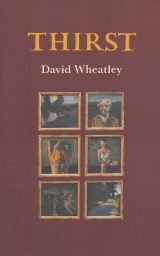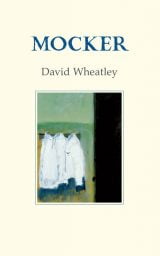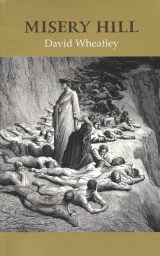Writing in Poetry Review Roddy Lumsden found cause to praise David Wheatley’s ‘wilfully impressive form and rampaging vocabulary’, while in the TLS Peter Reading commended his technical resources as ‘an unobtrusive pleasure to read’. A Nest on the Waves, taking its title from the folk belief that petrels lay their eggs at sea, ruminates on themes of travel, leave-taking and displacement. From his native County Wicklow by way of East Yorkshire where he lived, the poems trace an arc of excursions, actual or imagined, to Australia, Africa and Antarctica. Migrant workers, migrating birds and nomadic tribes enact something of the drama of where home might be.
From shamanism to the lives of saints, responses to the Donegal gaeltacht and homages to musical heroes (Brad Mehldau, Ali Farka Touré), David Wheatley’s curious, wide-ranging and now often open-ended verse gives grounds for Maria Johnston’s observation in the Dublin Review of Books that ‘the sense of possibility in Wheatley’s work seems limitless’.
David Wheatley is an Irishman who lives and works in Hull and, one way or another, a sense of place and displacement is evident throughout much of A Nest on the Waves. The title apparently comes “from the folk belief that petrels lay their eggs at sea”, but could also stand as a loose metaphor for Wheatley’s own life between two cultures and nations. The flat East Riding is somewhere he is temporarily from, not of, and the wry paean “Girl on the No 13 Bus” vividly portrays an aspect of the life, “urban yet simple” (to borrow Larkin’s description of its inhabitants), of his adoptive home town. Wheatley scrutinizes his subject with the inquisitiveness of an outsider on the inside: “She may live here but she comes from Brid. / This girl don’t go off on one neither”.
The same scrutiny underlies “Migrant Workers” – a category Wheatley fits, of course, though the poem points to those whom the term usually denotes these days in the east of England. They come from towns out east to stoop to the earth this harsh-grained Lincoln dawn, then stretch by the road, their day’s shift done, stopping when this man says they stop. This one has a Master’s degree, this one a girl in Brno and a girl in Grimsby.
And “The children they have yet to meet / call here/there home in this/that tongue”. There is wry irony in these observations, as well as acuity – and a concomitant wistfulness. The same resonances fortify the overlong but engagingly tangential “Lament for Ali Farka Toure”, a sequence of short poems about Australia (“Up was down. Clarity was confusion. / The words I spoke had suffered an inversion”), an ode “To the M62” – and, well, almost everything else in the book. Wheatley’s poems are particularly alive to dexterities of language and cadence. He exults in manipulating the volte-face possibilities of line-breaks, and the types of heat and light given off when different combinations of words, lines, clauses, rhymes, half-rhymes, rub against one another:
It is far from its nest the lapwing sings.
Wherever it leads you you are misled
and wherever you look look elsewhere instead
past the power lines’ fiddle strings.
— Rory Waterman, Times Literary Supplement
David Wheatley is one of those Irish writers who, in Bernard O’ Donoghue’s suggestive phrase, seems to be neither ‘Here Nor There’. Like, perhaps, Ian Duhig or Alan Gillis, he is most at home at a conceptual meeting point between Irish and English poetry, citing an Irish saint here, nodding to Yeats there, and turning a sharp eye on his adopted city of Hull:
People of Drypool, Drypool folk!
Promise me someone gives a fuck.
This elasticity of roots — not the same thing as rootlessness, for all the ironic melancholy of his collection’s title, A Nest on the Waves — gives his work a range of reference that approaches the global. He is as adept elegising the great Malian musician Ali Farka Touré as he is eulogising the jazz musician Brad Mehldau (though the latter is greeted with the slyly qualified opening, ‘you were / born a week after me // and have spent a lifetime / overcompensating’). He is as engaged and engaging on a voyage to Donegal’s Tory Island as on a flight to Australia. Indeed, the position between cultures is where his poetry most happily situates itself, recalibrating distance and intimacy of address as much as of location. As he says in the Tory Island poem, ‘All islands are mainlands,’ with the implication that each poem is or could be a literature — the question is how much of the world has it access to, and what instruments can it employ to expedite this?
One of Wheatley’s main tools is a sardonic and devastating wit, which he turns on the parochial wherever it is encountered, as in the brilliant ‘The Antarctic Poetry School’ where poetry’s self-defensive subtleties and ever-eager paranoias are exposed by reference to a School well able to cope with ‘the absence / of even one writer’, and in which ‘Most traditional verse forms / are too complex to have been ever attempted’. What he adds to this ready satiric edge is a sudden expansion of the poem’s imaginative register, so that the humour gains intellectual resonance without dropping its guard, as in this ending:
Do you have this typeface
in white, please?
There is, between all
local dialects,
one word for snow
and that word is ‘snow’.
His other principal method of establishing his verse’s integrity, what could be thought of as its referential depth of plane, is by powerful direct appeal to the reader’s senses. ‘A cormorant drying its wings / steps down refreshed from its cross’ convinces us visually at the same moment as the poem sets about its symbolic task. And this return to one type of home, from ‘La Ultima Canción de Cesar Peru,’ has both a physical manifestation and a dreamlike persuasiveness:
House
after house the doors grow
smaller, sharp-eyed
women stooping
and squinting as I salute, until
I enter the house of my childhood
down on all fours.
Formal curiosity gives the book another level of variousness to these matters of tone and symbol — the thirteen line sonnet favoured by Brownjohn and Szirtes makes another appearance in ‘Triskets’ on Trieste and Slovenia; while the jump from epigram to extended sequence is enacted without losing precision – from the marvellous ‘E M Cioran in Tatters’ with its ‘Preposterous thought: / an impotent rat’ to the vigorous attempt to translate the musical largesse of Touré into vivid shamanic images of hippos and crocodiles, the ‘Pale Fox’ and the goat whose ‘capsized image // shakes a silent bell’. This is nimble work that marks its theme as an estrangement which only finds its proper home in verse, and it therefore resonates with the same paradoxical power as that ‘silent bell’.
— W N Herbert, Poetry London Review
A girl on the No 13 bus, a Belfast train, the M62, a backstreet pub where “a dog sips a pint” – despite their often everyday focus, there’s an ingenuity and energetic restlessness evident in David Wheatley’s poems. Admirers of his previous books will find the same quick wit and alert persona operating at full tilt, in writing formal and free, eloquent and plain-speaking. In the powerful “Migrant Workers”, for instance, the discreetly rhymed quatrains imagine “the children they have yet to meet” calling “here / there home in this / that tongue”.
Wheatley’s is a poetry of displacement, uncertainty and sheer possibility; jumping from place to place, idea to idea, the real to the imagined. So while the invented “Antarctic Poetry School” – and contemporary poetry itself – receives a wry, damning appraisal, a sequence praising the late African blues musician Ali Farka Touré celebrates Malian culture; “whistling / a tune whose name / means happiness”. Stimulating, resourceful and often very funny, this is an impressive collection.
— Ben Wilkinson, The Guardian
Letting in the light, edging into the dark . . .
As poets both Sweeney and McGovern are in their different ways modern traditionalists: both of them, that is, compose along a (usually condensed) narrative grid. In the younger David Wheatley’s work, on the other hand, one senses a restless postmodern consciousness, tugging this way and that at the dazzling display of particularities that is the world, as well as at the mind’s own brimming variety of responses, all pressuring language itself to discover a style that will be sufficient to its task of rendering what for want of a better word we’ll call reality. Mostly, I’d say, it’s a style allied to the habits of collage. As an imaginative strategy this properly (and kinetically) embodies the poet’s shrewd, articulate, always wide-awake, endlessly curious sensibility, showing – in how he relishes sensuous surfaces – his delight in (to use MacNeice’s immortal phrase) “the drunkenness of things being various”.
The title of A Nest on the Waves evokes a peaceful corner in a world of turbulence (perhaps that corner of respite where poems can be hatched). Emotionally attached to notions of home, this is also a book of visitations – to places near (the Sally Gap, Mweelrea, the N11) or far distant (west Africa, Australia). The poet, however, is never the tourist or sentimental memoirist but a maker of documentaries – mapping the landscape, taking well informed note of fauna (some lovely bird poems), flora and local habits, and reflecting on his own presence. In such poems the counterpointing habits of collage are his orchestrating agent (such as in the brilliant Lament for Ali Farka Touré , where his canvas includes Pepsi, pizza and west African rituals).
At times a poem (such as Antarctic Poetry School) can descend into archness (the blow-away foam of a witty, well-informed intelligence, I guess), or be opaque (Semaphore), or make too self-conscious a display of its knowledge ( Triskets ), or be simply slighter (such as Little Ones ) than the most fully realised pieces. But with his allusive richness of texture, his sense of history, his ability to take on with convincing panache other voices (such as The Lock Keeper’s Daughter, The Recusant St Brenhilda on Sula Sgeir), his startling imagery (“the triplets on the beggar’s guitar / sputtered like tachycardia”), his formal relaxation and nicely calibrated freshness of language (a kingfisher “combusts”), Wheatley’s best poems – especially those in which one detects the telling fusion of subjective feelings and objective facts (such as The Shadow Life ) – have an original shine to them, and their “light is what / we see the dark by”.
— Eamon Grennan, The Irish Times






